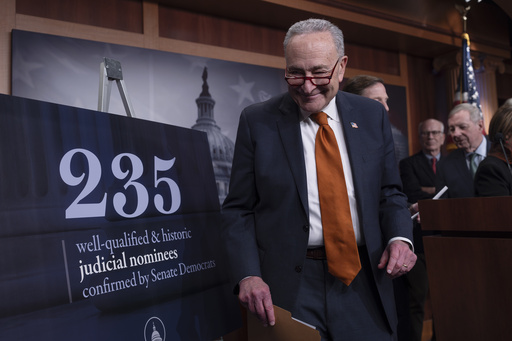On Friday, President Joe Biden achieved a significant milestone by confirming the 235th judicial nominee of his administration. This accomplishment surpasses the total achieved by his predecessor by one, highlighting the emphasis Democrats placed on the federal judiciary in response to Donald Trump’s extensive influence during his first term, particularly his appointment of three Supreme Court justices.
Senate Majority Leader Chuck Schumer orchestrated votes for two district judges from California, marking the last confirmations of the year before Congress breaks for the upcoming sessions dominated by a Republican majority. The confirmation of Serena Raquel Murillo as a district judge for California’s Central District not only broke Trump’s record but also represents the highest number of confirmations for a single presidential term since the administration of Jimmy Carter. As the Republicans prepare to take control next year, they may seek to expand their imprint on the federal judiciary further.
Biden and Senate Democrats made a concerted effort to diversify the judiciary by incorporating more women, minorities, and public defenders among Biden’s appointments. About two-thirds of the judges appointed under Biden are women, and a significant majority are people of color, the most notable being Supreme Court Justice Ketanji Brown Jackson, who made history as the first African American woman to serve on the Supreme Court.
In a statement, Biden expressed pride in fulfilling his vision for a judiciary that mirrors the diversity of the nation. “When I ran for President, I promised to build a bench that looks like America and reflects the promise of our nation. And I’m proud I kept my commitment to bolstering confidence in judicial decision-making and outcomes,” he said.
Senator Dick Durbin, the Democratic chairman of the Senate Judiciary Committee, commented on the previous lack of diversity on the bench, where white males largely dominated. He noted the intentional effort to bring more women into the judiciary, citing a robust talent pool available for these positions. “I think it’ll enhance the image of the court and its work product to bring these new judges on,” Durbin remarked.
Moreover, Biden prioritized appointing civil rights attorneys, public defenders, and labor rights lawyers, enriching the professional diversity of the federal judiciary. Over 45 of his appointees have backgrounds as public defenders, while more than two dozen have experience as civil rights lawyers.
While Biden achieved more district judge confirmations than Trump, he appointed fewer judges to the higher-tier circuit courts—45 compared to Trump’s 54. Additionally, he secured only one Supreme Court seat versus Trump’s three. Democrats faced challenges when a Republican-controlled Senate rushed to fill Justice Ruth Bader Ginsburg’s position just days before the 2020 presidential election following her death.
Throughout the current Congress, Senate Democrats regularly pushed through judicial nominations despite operating with a closely contested 50-50 Senate. Schumer consistently brought nominations to the floor, spurred by calls from liberal groups for Democrats to be as proactive in confirming judges as Republicans were under Trump.
Some Republican senators, however, expressed strong disapproval of Biden’s nominees. Senator Ted Cruz of Texas claimed that the supposed diversity did not encompass the perspectives of those appointed. He criticized Biden’s judicial selections as being excessively partisan and reflective of what he saw as a shift toward the extreme left among Democrats in the wake of Trump’s presidency.
Meanwhile, progressive advocacy organizations expressed satisfaction with the judges confirmed by Democrats, particularly emphasizing the caliber of the nominees. They argue that increased diversity in both personal and professional backgrounds enhances judicial decision-making and fosters greater trust among the public. “To achieve equal justice for all, the federal judiciary must be representative of all, and that is why we applaud this administration for focusing on both professional and demographic diversity,” stated Lena Zwarensteyn, a high-ranking official at a civil rights organization.
Senator Charles Grassley of Iowa, slated to become the next chair of the Senate Judiciary Committee, noted the determination exhibited by Democrats regarding judicial confirmations, suggesting they learned important lessons from Trump’s tenure. “They realized the significance of the number and type of judges appointed to the courts,” Grassley stated.
The Democrats’ urgency in confirming nominees was amplified as they witnessed pivotal Supreme Court decisions, including the overturning of abortion rights, the nullification of affirmative action in educational institutions, and limitations on the federal government’s authority to enforce regulations concerning the environment, public health, and workplace safety. These developments underscored the impact of judicial power in the American political landscape.
Schumer expressed his enthusiasm for the milestone achieved, highlighting that one in four active judges are now Biden appointees. He stressed that in judicial appointments, Democrats have sought diverse qualifications and experiences beyond what he described as a “privileged pool.” “I’m very proud of this milestone, not solely for the number but for what it signifies,” Schumer said. “Our bench is now markedly more balanced in terms of experience and qualifications compared to four years ago.”
As Trump looks forward to potentially filling nearly three dozen judicial vacancies, that number is likely to grow due to retirements from Republican-appointed judges waiting for a Republican to reclaim the presidency. Senator Richard Blumenthal from Connecticut, while acknowledging the progress made by Democrats, expressed a tempered enthusiasm, aware that Trump could further influence the judiciary. “We need to remain vigilant and prepared to counter appointments that may be unacceptable,” Blumenthal remarked. “We have substantial work ahead, and the outlook is daunting.”
Grassley optimistically promised to surpass Biden’s confirmation record, stating, “Mark my words, by January 20th, 2029, Trump will be boasting about securing 240 judicial appointments.”




